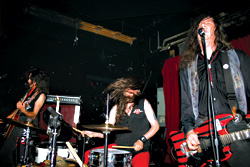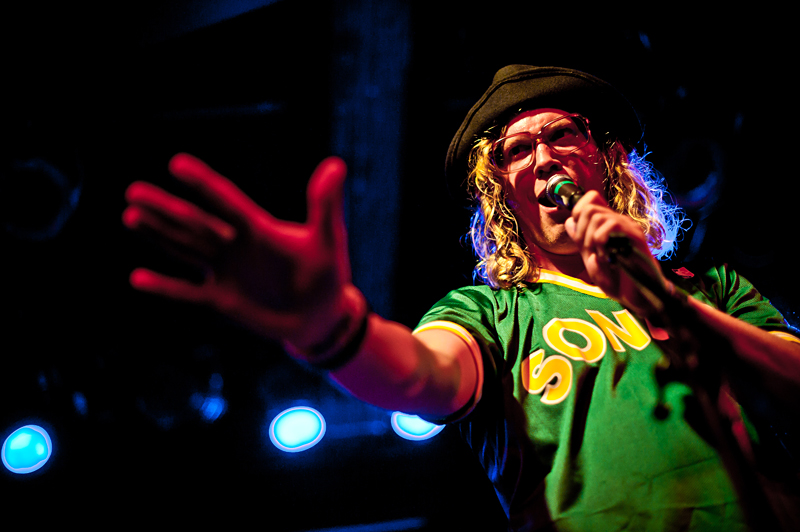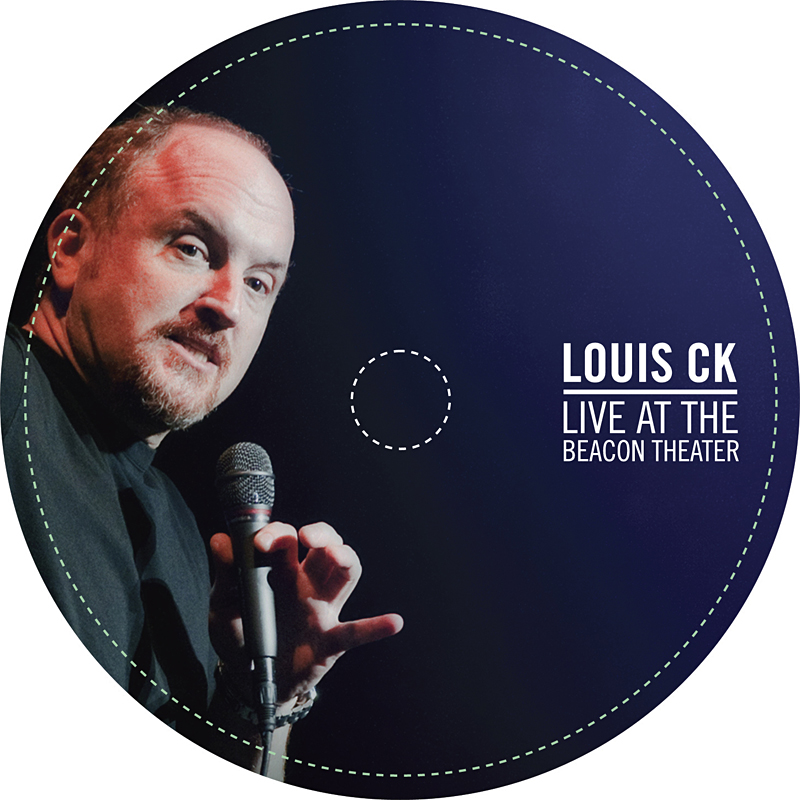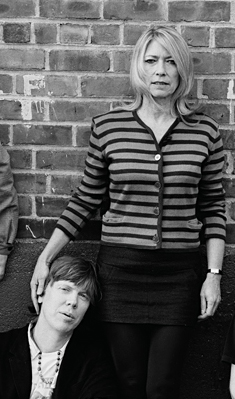Fred Cole downshifts, his old Ford Scottsdale heaving as it veers off a county road onto an overgrown path leading back to the home he shares with his wife, Toody. Cole is a big man with a broad set of shoulders, long graying hair, and sad, Labrador eyes—the right side of his face marked with a crescent and skull tattoo. Though we are only about 30 miles east of Portland, Ore., the closer the truck gets to Cole’s home, the more it feels like the middle of nowhere. The yellowed fields are vast, and moss-covered firs loom large overhead. It’s a world apart from the Fred Meyers and Shell stations pockmarking the Clackamas freeway exit a few miles back. This path to the house is walled on all sides by creeping blackberry bushes, which scrape against the side of Cole’s truck as he pulls in.
“I was talking with this agent in New York City,” he says over the roar of the engine. “And the agent says, ‘I’ve had so much trouble with these BlackBerries.’ I says, ‘Well, have you tried this Crossbow shit? You just spray it on the blackberries and it kills them all.’ Agent’s like, ‘What the hell are you talking about?’ I says, ‘Crossbow! It’ll kill all your blackberry bushes!’ Turns out, he’s talking about those fuckin’ personal organizer/cell phone things, and here I am thinking he’s having problems with his blackberry bushes.”
He pauses to ponder the insanity of the exchange and shakes his head with a grin.
“But the Crossbow shit really does work,” he adds.
If Fred Cole is unaware of the technological advances of late, he can be forgiven. He’s never needed any to get by. Though he’s a 59-year-old grandfather of seven, the guy is hardly out of touch. For the last 20 years, Cole has fronted Dead Moon, one of the most revered underground bands in the Pacific Northwest, whose extreme DIY ethic and wild brand of bare-bones rock and roll have made them an icon to many a Seattle music luminary.
Mention Dead Moon to Seattle’s rock deities, and you’ll get an uncannily positive response. To anyone familiar with the trio, it’s a band that can do absolutely no wrong. Krist Novoselic of Nirvana calls them “the real Northwest rock.” Pearl Jam’s Eddie Vedder counts them among his favorite bands. And Steve Turner of Mudhoney places singer-guitarist Cole on the same playing field as Neil Young. But mention the name Dead Moon to most people, and you’ll doubtless be met with a shrug. Dead Moon are barely, if ever, spun on the radio and have never been signed to a major label—selling very few albums. But Dead Moon inspire an unparalleled loyalty among their fans.
“I want to know everything about them,” says Love as Laughter frontman Sam Jayne, who cited low attendance at Dead Moon shows as his reason for leaving Seattle. “I want to know what they do all day when they’re not on tour. I want to know what Fred Cole eats for breakfast.”
Fred Cole is a Tacoma native whose music career dates to 1964 with a band called the Lords. They released one single, “Ain’t Got No Self-Respect,” before disbanding. His next band, the Lollipop Shoppe, landed opening slots in California for the Animals, the Doors, and Big Brother and Holding Company with Janis Joplin, among others. Their one single from 1968, the garage-psych scorcher “You Must Be a Witch,” was released to mild acclaim—yet they disbanded in the same year (the single, however, landed on Nuggets, the legendary box set of psychedelic rarities). Today, holding that track up to anything by Dead Moon, you can see the raw rock and roll journey Fred Cole was about to embark on. Over the next several years, Cole would marry Toody, homestead in the Canadian Yukon, purchase the 22-acre property in Clackamas, build a house there from scratch, raise three children, open a guitar shop in Portland, build another, bigger house, also from scratch, remodel rental properties in Portland, open another guitar shop in Clackamas called Tombstone Music as well as a general store bearing the same name—all while playing in a succession of Northwest punk bands, including Zipper and the Rats (with Toody as bassist).
In 1987, however, Fred and Toody, along with drummer Andrew Loomis, started the band they would become best known for: Dead Moon. The goal was simple: strip rock and roll to its barest, most skeletal essentials. If people liked it, they liked it. If they didn’t, fuck ’em.
“Anybody can be doctored to the point of no return,” says Toody Cole of Dead Moon’s music. “That’s why we don’t use reverb or any effects on the vocals. It’s raw, it irritates a lot of people, but it’s real. You can feel the emotion in our music, and it’s not buried under layers of crap.”
Because of their in-your-face approach, Dead Moon are not always the most immediately appealing act. Listening to their fuzzed-out rock riffs and unadulterated vocal wailings can be a shocker. They are as distilled as rock music gets, sometimes sounding as guttural as horny animals. At their most primal, Neil Young and Crazy Horse have come close to achieving a similar aesthetic, but aside from them, Dead Moon have no contemporaries.
“There is something pure and raw about them that you don’t really find very often in rock bands,” says Erin Sullivan, singer-guitarist for the A Frames. “There’s a kind of innocence and purity to their music and their motives that can’t help but make you appreciate them.”
“It’s a genuineness,” says Mudhoney guitarist Steve Turner. “They’re outsiders, and they’ve made that work in their favor.”
And it’s as outsiders that they’ve been toiling for the last 20 years, releasing 13 LPs and countless 7-inches with virtually no assistance from the industry at large. Last Tuesday, however, Sub Pop Records helped shed at least a little light on the Northwest’s most tireless trio, releasing Echoes of the Past, the first Dead Moon anthology—a project that is largely the brainchild of Sub Pop’s former regional publicist Jed Maheu, who is currently the marketing manager for Los Angeles–based Hustler magazine.
“I don’t even remember why I wanted to the do the anthology,” Maheu says. “It was just one of those ideas that pops into your head, y’know? Dead Moon has been one of my top 10 bands of the last [several] years. I remember seeing them at the Sit & Spin several years ago and was just blown away by the way they looked with the black jeans and the long hair and shit. I remember thinking, ‘I totally wanna grow my hair long.'”
Maheu’s love of Dead Moon deepened when he discovered the band hailed from his native Clackamas.
“We lived in this trailer park for 10 years, which was really sketchy,” he says. “To me, it was normal, but to anyone from the outside, it would’ve seemed like a total shithole. I mean, people set food out on their front steps, and we had mushrooms growing in the closet; there were always kids fighting at the bus stop. One time we tried to sell the trailer, and this fat lady came over to look at it and fell through the floor. So it’s sort of a weird relationship I have with the band because of that.”
When he approached the A&R team at Sub Pop with the idea to compile the best of Dead Moon, Maheu says there were no questions asked.
“They brought me into an A&R meeting and said, ‘Tell us your idea,'” he says. “I told them I wanted to do this Dead Moon anthology, and they said, ‘OK, go for it.’ It was one of the easiest fucking things I ever tried to do there.”
With the project green-lighted, Maheu took on the task of convincing Fred Cole it was a good idea, which proved more difficult than Maheu had bargained for.
“Dealing with Fred is just like dealing with any other old person, especially anytime business gets discussed,” says Maheu. “He starts giving you the whole ‘Well, if we’re gonna do it, we’re only gonna do it our way. We’ve been screwed over too many times.’ Approaching him in the beginning was just like, ‘Oh God, I don’t wanna deal with this.’ But one night, I had this old yellow Camaro and Dean [Whitmore, Sub Pop’s director of direct sales] and I are out driving to go see Dead Moon. The wire on my car battery caught fire, and there’s flames coming out of the car. Dean and I are freaking out. But when we eventually went to go talk to Fred and Toody, we tell them about the car, and we end up talking for a couple hours about old cars and shit.”
Considering the anthology was to be done exclusively on Fred Cole’s terms, it was up to him to compile the song list. What he ended up with were 49 tracks, spanning the entire length of the band’s career—with the exception of anything from their 2004 album, Dead Ahead (distributed by Sub Pop).
“I know [Fred] labored over those tracks for quite a while,” says Whitmore. “When he handed over the list and said it was final, I wasn’t about to ask why there weren’t any Dead Ahead tracks on it. When Fred Cole says something is final, it’s final.”
Though Maheu departed Sub Pop before he could see the anthology through to fruition (Whitmore took over where he left off), he says he is pleased with the final product, though he’s still not sure if it will bring Dead Moon to any new level of fame.
“I say that because I’m a realist,” he says. “And by that I mean I’m a pessimist. But you never know. For instance, when we did the [Australian punk legends] Radio Birdman anthology, that was a huge success. I thought we’d only sell, like, 1,000 copies of that. But one thing Radio Birdman had was that they were from the ’70s and part of this whole scene back then. Dead Moon is completely on their own. Always has been. They weren’t part of any scene. I mean, they started basically the same year Sub Pop got started with all those grunge bands. But they weren’t grunge. They were just Dead Moon. But what they still have is a ‘fuck you, everybody’ insanity about them.”
Sub Pop’s marketing director, Steve Manning, echoes Maheu’s sentiment.
“At this point,” says Manning, “we’re probably not gonna have a whole lot of converts. But for some people, all they need to do is go see them or hear them once and they’re hooked for life. I mean, Dead Moon’s not Pitchfork material. KEXP will probably play it a little because it’s a new record of ours—but probably very little.”
From the opening blues guitar cry of “Graveyard” to the solemn, minor-key dirge “Too Far Gone,” it’s obvious Dead Moon won’t resonate with the urban indie-rock crowd. Every wrong note is there, every fudged solo. Yet if they listen closely, fans of the White Stripes will no doubt find a similarity between Fred Cole’s immediately shrill voice and Jack White’s. Imagine rural balladeers like Dock Boggs dragged through the muddy back roads of ’60s psychedelia and ’70s punk, and you’ll end up somewhere close to the core of Dead Moon’s music.
Songs like “Dead Moon Night,” “40 Miles of Bad Road,” and “54/40 or Fight” are soulful, powerfully anthemic, and hopeful. On Pearl Jam’s 2000 tour, the band took to covering the Coles’ “It’s OK.” Crowds all over the world sang the chorus, “It’s OK, we’ve all seen better days,” over and over as Eddie Vedder led them. On Pearl Jam bootlegs, it sounds akin to a Zen axiom, a reminder that all we humans have is right now, so we’d better make the best of it. After all, that’s the same philosophy the Coles have lived by; when you have nothing, the best you can do is make something of it.
“Dead Moon is such a part of the Northwest pantheon that it’s just great to be able to put this out,” says Manning. “They’re sort of moss-covered and sound like they’ve been making this music out in the middle of the woods somewhere. The music sounds like it couldn’t have been made anywhere else but here. It couldn’t have been made in L.A. or New York. All our bands used to sound that way, and that’s something the Northwest has lost over time. But Dead Moon has continued to sound exactly like that, like something lost in time.”
Out near the Coles’ property in rural Clackamas, the only sounds are those of small birds hiding out in the tangle of blackberries and the thick, nasally calls of crows. A low, gray ceiling of clouds hangs overhead, and no other houses are in sight—just a mass of untouched weeds and trees dotted by broken-down cars, exhausted tour vans, and the occasional pile of orphaned lumber.
Upon opening the huge front door to the Coles’ home, visitors are greeted by an inlay of a black eagle and the name “COLE” spelled out in sliced tile across the weather-stripping near the door frame. Inside, the walls are decorated with Dead Moon posters and old storefront signs Fred Cole has found or used over the years, including the Captain Whizeagle’s Guitar Shop sign (the old Portland music store where Courtney Love purchased her first guitar). In the kitchen, straight ahead from the front door, stands Toody Cole.
“Give him the full tour,” Toody says in her smoke-and-honey voice. She is of slight build, with a square jaw and hawkish set of eyes, her brow pointing toward her nose at a sharp angle.
Fred wanders around, pointing out the hardwood floors of the living room (“I took this wood from an old gymnasium floor”), the webbed design of the staircase railing (“I used old table legs for this”), the old-world solidity of his bed (“I built this out of scrap wood in the ’70s in Los Angeles”), and finally, the tiny music room where he and Toody practice. There, on the floor, sits the same mono lathe press on which Northwest rock legends the Kingsmen cut the garage-rock classic “Louie Louie” (“I fucked around with that thing for three months before I got sound out of it”). And it’s not treated as a novelty museum piece in their home: Dead Moon have pressed the masters to 13 of their own LPs on this lathe.
Fred heads back outside, cutting through a swath of weeds to the old shack where he and Toody raised their three children, Shane, Amanda, and Weeden.
“I built this place in the ’70s,” says Fred as he kicks open the door to the old home, its rusted hinges screeching as he pushes through. “And one day the sheriff of Clackamas shows up with his deputies and says, ‘You’re building illegally. If you don’t tear this place down, we’re gonna come out here at midnight and burn the place to the ground.’ Me and Toody had two little babies. I built this place by hand. I wasn’t about to let them burn this place down, so I waited up all night with my shotgun for those fuckers to come—and they never showed. To this day, the authorities haven’t bothered with us one bit.”
“We lived like I imagine the pioneers did,” recalls the Coles’ daughter, Amanda Blaufus, of her childhood. “We had a wood stove, and my mom and I had to heat up water to wash the dishes by hand. And when we wanted to take a bath, we needed to heat up the water. When we were in the shack, my dad had to build a bridge for us to cross the creek so we could get to the road. When it rained really hard, the bridge would float away and my dad would have to carry us across.”
Blaufus even recalls living in a tent until Fred built their shack, and peeing in the woods until he could build a proper outhouse.
“Every summer,” she says, “my brothers and I would go out with my dad and his chain saw. We would cut the trees for firewood, chop it up, and load it to be carted to the shed where my mom would be stacking. I didn’t realize my parents were different until I started having friends come over to the shack, and then [I’d] go over to their houses [that] had all the conveniences of modern living.”
Just as striking as their survivalist lifestyle is the fact that the Coles have managed to write tons of great rock songs while carving out this hardscrabble existence.
“I mean, I can’t picture any bands today doing what they did,” says Maheu. “Let’s have a bunch of kids and homestead in the Yukon! And we don’t have a house, so we’ll build one! No matter how hard shit gets for them, they still keep going. They are really American to me, but in a good way. They have a rebelliousness about them that our country has lost along the way. And I love that about them.”
Though they hail from Oregon, Fred says Dead Moon have always been regarded as a Seattle band, something Sub Pop’s Manning says stems from the fact that they play here constantly. Moreover, Dead Moon continue to embody what Seattleites have come to regard as the pure Northwestern attitude—that “fuck you, everybody” insanity Maheu alludes to. After talking to several people, what becomes apparent is that the biggest contribution Dead Moon have made to Northwest rock is that they’ve done it all themselves.
“I think they set an inspiring example for anyone who has a passion they want to devote themselves to completely,” says the A Frames’ Sullivan. “They’ve managed to make their art their life and survive all the ups and downs that go along with that, which is a pretty great example, if you ask me.”
“Dead Moon is the total embodiment of how I’d like to live my life,” says Coconut Coolouts bassist Lacey Swain.
“Just the way they put out their own records, regardless if anyone listens or not, is such an inspiration,” adds Love as Laughter’s Jayne.
But it doesn’t come easy. Together, Fred and Toody only make about $20,000 a year. To supplement their income from the band, they renovate rental properties in Portland and have launched guitar and general stores near the Clackamas freeway exit. Thus, the pair only sleeps about four hours a night. The bottomless well of energy they have is difficult to fathom, both in their daily life and onstage. After a full day of work, most people are sapped of their energies and can’t even stay awake to watch a rock show, let alone play one. That they are both almost 60 makes them all the more phenomenal.
In concert, all it takes for Dead Moon to put on a show is one guitar, one bass, one drum kit, a cigarette, some alcohol, and a lit candle placed atop a Jack Daniels bottle. It’s impossible to single out a singularly great Dead Moon show, because they are all performed with the same level of intensity. And though the exact history gets blurred over time, the band is notorious for sending an audience into a stupor with their relentless rocking, often prolonging their set until that lone candle melts into darkness.
“I can’t even remember most Dead Moon shows,” says Maheu. “I am usually so fucking hammered halfway through their sets. But I remember one time at the Sit & Spin, just watching a bunch of my friends act like complete drunken idiots at the front of the stage. They were just so fucking wasted. They were moshing, and throwing themselves into each other.”
“I remember seeing them at the Central Tavern and thinking, ‘What the fuck is this?'” recalls Sub Pop’s Manning. “I mean, this was 15 years ago, and even then, they were significantly older than most people you saw onstage. But they had more energy than most of the younger bands.”
For Steve Turner—who, in addition to playing in Mudhoney, often performs solo and unplugged—Fred and Toody Cole seem possessed of almost superhuman powers.
“One of the reasons I started playing acoustic music,” says Turner, “is that I couldn’t see myself playing hard rock with Mudhoney at 60 years old. I mean, I looked at Dead Moon’s recent tour schedule and thought it was insane. But I remember when they used to play shows up here at the Vogue in the early ’90s, and Mark [Arm] and I would beg them to stay with us so they didn’t have to drive back to Oregon. But they never did. They just packed up their gear and drove all the way back at 3 in the morning.”
And as the Coles get older, this restlessness is cause for concern, even among their children.
“I do worry sometimes,” says daughter Amanda. “I used to worry a lot more a few years ago, but I finally realized they are doing what they love, and that’s what matters. If they die tomorrow, I’ll be sad—but also at peace knowing they were happy and did what they were enjoying. I don’t ever see them fully retiring. I think they see themselves as semiretired now, but they still keep every minute of every day filled with something to do. When they do need a break, they take a week or two off and head to Reno to play penny and nickel Keno. I see them as workaholics, but I think they’ve found a balance that works for them.”
Right now, Dead Moon are on a 41-date European tour that will keep them on the road until the middle of November. For anyone not accustomed to touring, a run like this is exhausting, even for passionate twentysomethings. But to Fred, it’s no big deal.
“My kids are always saying, ‘Dad, we’re worried about you,'” he says. “‘You smoke all the time and only sleep a few hours a night. You probably got tumors on your lungs, and your prostate’s gonna fall out.’ They say all this shit and blah, blah, blah. But I’m not gonna sit around worrying about this shit. We only live once, right? Might as well do it while you can.”
He shakes his head again and lights up another smoke. Then, out of nowhere, he adds: “And they got this Portland marathon coming up in the spring that I’m gonna enter. My kids have all run marathons, and I figure I’m gonna run the damn thing even if it kills me.”








